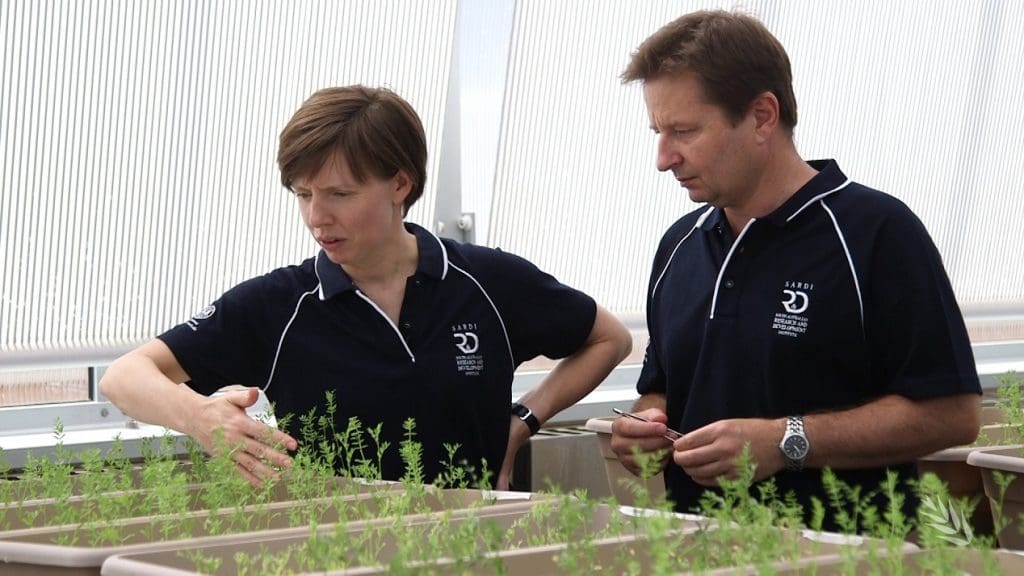
SARDI researchers Liz Farquharson and Ross Ballard have been involved in a decade-long research program with GRDC investment that is working towards development of a new commercial strain of rhizobia to improve the nodulation of bean and lentil in low pH soils. (Photo: GRDC)
GRAIN growers planning to sow pulses into acidic and dry soils this season can greatly improve nodulation by doubling the inoculation rate.
Studies conducted through a Grains Research and Development Corporation (GRDC) investment have shown that increasing the rate of inoculant applied to seed improves nodulation where soil conditions at sowing are suboptimal.
Researchers at the South Australian Research and Development Institute (SARDI), a division of Primary Industries and Regions SA, say an increased inoculation rate also provides a practical way of improving nodulation where legumes are being sown for the first time, especially on hostile soils.
“Our results to date indicate that to optimise nodulation when dry sowing, application of rhizobia in high numbers is required,” SARDI senior research officer Liz Farquharson said.
“Increasing the rate of inoculant application always improved nodulation.”
However, Dr Farquharson said some growers had experienced seeder blockages when they had increased the inoculation rate, so she recommends testing a small batch of seed first to avoid such problems.
She said growers should to take particular care if they intended applying rhizobia to seed along with pesticides, especially when sowing into suboptimal soil conditions.
“Where pesticide application is necessary, granular rhizobial inoculant or a peat slurry in furrow may provide a better option, reducing direct exposure of the rhizobia to the pesticide,” she said.
Dr Farquharson and SARDI researcher Ross Ballard have been involved in a decade-long research program with GRDC investment that is working towards development of a new commercial strain of rhizobia to improve the nodulation of bean and lentil in low pH soils.
It is hoped the new strain will have a substantial impact in the southern cropping region where pulse production is expanding into higher rainfall areas with characteristically low pH soils.
“We believe that this new strain has potential to improve the production of pulses on around a hundred thousand hectares of ground so it’s quite significant,” Mr Ballard said.
If data supports the release of the strain of rhizobia with improved acid tolerance, it is likely to be commercially available in 2021.
Meanwhile, the researchers said improved rhizobia should be seen as an accompaniment, not a replacement, for liming.
“Liming remains important to prevent further acidification and is critical to the longer term sustainability of the farming system,” Mr Ballard said.
“Plant root growth will also likely benefit from the addition of lime and improve overall performance of the pulse crop.”
Dr Farquharson said research into understanding more about how rhizobia survived and nodulated under a range of stressful conditions was continuing so improved inoculation recommendations could be provided to growers.
Source: GRDC
More information on current research efforts and outcomes can be found in the GRDC Grains Research Updates paper, ‘Fixing more N – improving the performance of rhizobial inoculants in suboptimal conditions’, at http://bit.ly/2uI94zy.
Other useful resources include:
Legumes in Acid Soils – Maximising Production Potential publication, https://grdc.com.au/legumes-in-acidic-soils
GrowNotes Tips & Tactics: Legumes and Nitrogen Fixation, https://grdc.com.au/tt-legume-n-fixation
Inoculating Legumes: A Practical Guide, http://bit.ly/2WHEDFp
GrowNotes Tips & Tactics: Nitrogen Fixation in Field Pea, http://bit.ly/2OJEK0m.



HAVE YOUR SAY